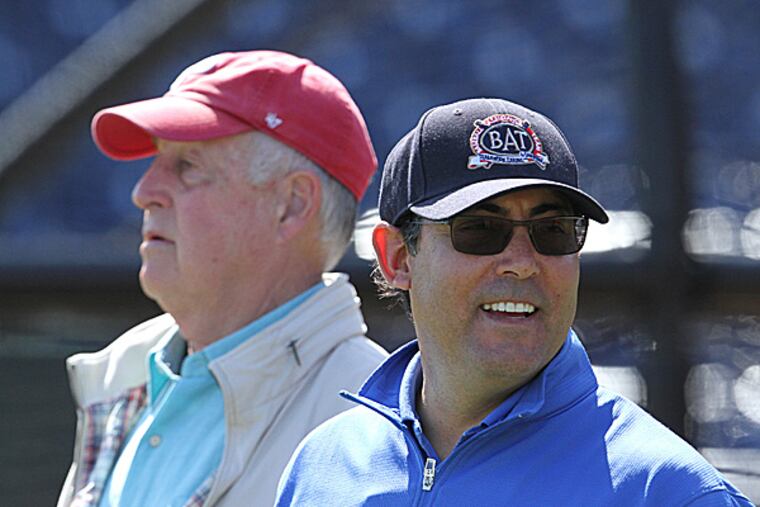Gillick, 77, charged with turning Phillies around
The two men spearheading the Phillies' transition from perennial contender to long-term rebuilder face uncertain futures in their current roles. Pat Gillick, 77, is committed through this baseball season but took on the president's role on only a short-term basis. General manager Ruben Amaro Jr., 50, is in the final year of his contract.

The two men spearheading the Phillies' transition from perennial contender to long-term rebuilder face uncertain futures in their current roles. Pat Gillick, 77, is committed through this baseball season but took on the president's role on only a short-term basis. General manager Ruben Amaro Jr., 50, is in the final year of his contract.
That makes this an unusual rebuilding project.
"Let me put it this way, the general manager, he's been around for a long period of time. I've been around for a long period of time," Gillick said in a recent interview. "We're going to do from a professional standpoint what we think is the right way for this organization to go.
"We're not going to make a decision that's going to affect us in any way personally. From the standpoint [of], we're not going to make a deal or we're not going to do something that's going to save his job or going to save my job. We're going to do what we think is in the long-term best interest of the Phillies."
Gillick became the Phillies' permanent president in January when the team announced that David Montgomery, who held the role since 1997, would assume the chairman position. The recent front office shake-up could pave the way for Gillick, in conjunction with ownership, to pick the next Phillies president. An eventual decision on Amaro's future will be made "collectively," Montgomery indicated in a recent interview on SiriusXM's MLB Network Radio.
Gillick has direct oversight over Amaro, and both men answer to the Phillies ownership group led by John Middleton, the wealthiest of the ownership partners, and the Buck family.
Middleton, a private man who has become more visible in recent years, owns a 48-percent ownership stake in the team, according to a source with knowledge of the arrangement. Responding in October to a Fox29 report claiming Middleton was attempting to buy majority control, the team said: "Over the life of the Phillies partnership, no one entity or family has owned a majority of the partnership, and we do not foresee this changing in the future."
Gillick painted a picture of a united front among the biggest shareholders - Middleton and the Buck family. There has been no hint of monetary restraints from ownership, the team president said. The "marching orders," according to Gillick, are to "try to acquire as much talent as possible, as much young talent as possible."
Gillick, formerly the general manager of four clubs, has not embarked on a true rebuild in nearly four decades, when he led the expansion Toronto Blue Jays. For the oft-maligned Amaro, this past fall signified the start of his first rebuild since he took over for Gillick after the 2008 world championship season.
The team's transition began in earnest with the December trades of Jimmy Rollins, Marlon Byrd, and Antonio Bastardo and will continue throughout the season. Ace lefthander Cole Hamels has been a human trade rumor since the winter.
When it comes to trade talks, Amaro and Gillick are both involved. Gillick, a 2011 Baseball Hall of Fame inductee, said the GM is "very inclusive in his calls and in his decision-making."
Gillick is the first Phillies president without an ownership stake in the team since 1981, when Bill Giles and his business partners purchased the team. Whereas Montgomery oversaw both baseball and business operations in his 17-plus years at the helm, Gillick focuses mainly on baseball operations.
The Phillies recently promoted Michael Stiles, a former United States attorney for Pennsylvania's Eastern District, to lead their business operations. Gillick estimated he concentrates 80 percent of his time on baseball operations, the other 20 percent on the business side.
The baseball decisions he and Amaro make this season could have long-standing effects on the organization.
"I think what we want to do is hopefully get this thing headed in the right direction from a rebuilding standpoint," Gillick said.
"We want to try to acquire as much young talent as we possibly can and create the largest pool of players we can, from both the pitching side and the position-[player] side, and hopefully out of that pool there will be some players that will step forward and become Phillies."
@jakemkaplan